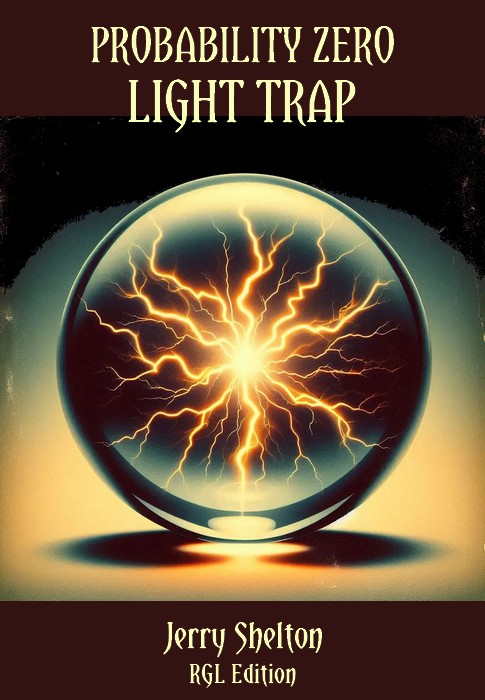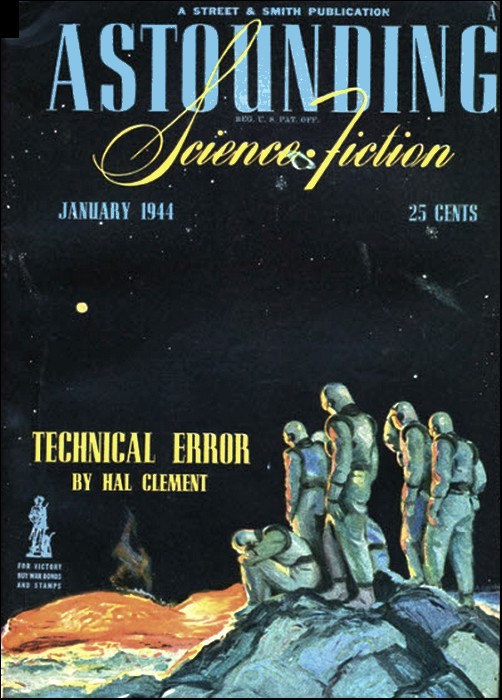
RGL e-Book Cover
Based on an image created with Microsoft Bing software
Roy Glashan's Library
Non sibi sed omnibus
Go to Home Page
This work is out of copyright in countries with a copyright
period of 70 years or less, after the year of the author's death.
If it is under copyright in your country of residence,
do not download or redistribute this file.
Original content added by RGL (e.g., introductions, notes,
RGL covers) is proprietary and protected by copyright.

RGL e-Book Cover
Based on an image created with Microsoft Bing software


Astounding Science Fiction, Jan 1944, with "Light Trap"
"Probability Zero" was a quirky and imaginative feature in Astounding Science Fiction magazine during the early 1940s. It ran between 1942 and 1944, and its purpose was to showcase short, humorous science fiction stories that were deliberately absurd or impossible. These were ultra-short tales—often just a few paragraphs—designed to be punchy and clever.
Both professional writers and ambitious fans submitted stories. Authors like Henry Kuttner, L. Sprague de Camp, and Fox B. Holden were among the contributors. The best story of each issue was chosen based on reader response, and the winner received payment.
"WHAT do you mean—'too much research hinders the advancement of science'?"
Young Norton sounded indignant as he removed his laboratory apron and hung it in the locker. "Research is the soul of science," he said precisely.
"Sometimes," muttered old Pop Weatherman, and picked up a broom. "Look at me. I'd be a specialist yet and a millionaire to boot—if it hadn't been for some smart-Aleck research technicians. Now I'm sweeping floors in this lab."
Norton sighed and looked at his watch. "Go on—I suppose I've got time."
Pop leaned on his broom. "You technicians in here are still burning the midnight oil trying to find a new source of cheap power—aren't you?"
Norton nodded and began to put on his coat.
"Well, sir"—Pop's eyes were dreamy—"when I was a youngster in this lab, another fellow and I—quite by accident—discovered Reflect-All."
"You mean that one hundred percent reflecting material used on—"
"Yep—didn't make any money out of it. The company owned the rights." Pop took a deep breath and continued, "Anyhow, we quit the lab and set up our own shop. We had discovered something else."
Norton cocked his blond head.
Pop appeared not to notice. "We'd discovered that if we coated the inside of a hollow metal sphere with Reflect-All and projected a powerful beam of light into a small opening and then sealed the opening shut—that the light, being one hundred percent reflected and having no exit, would keep bouncing back and forth, generating heat continuously. The heat created more light and the light created more heat and so on. Those things really radiated power—and cheap."
Norton's blue eyes widened. "I think I heard a rumor about those Light-Trap motors when I was in school. I thought—"
Pop snorted. "Never mind what you thought. The main thing is that they worked—and worked wonderful. We had a big company, started making all kinds of motors for all purposes and they worked swell. Everybody was using them all over the country and the problem of cheap power seemed solved until—"
Pop began to sweep the floor mechanically and then: "—until some smart-Aleck technicians started to conduct some research on those Light-Trap motors to try to make them more efficient."
"What did happen? Cheap power would solve—"
"Well, those technicians found out that those Light-Trap motors were theoretically impossible—and naturally, as soon as everyone knew the process was impossible—the blame things wouldn't work!"
Norton slammed the door.
Roy Glashan's Library
Non sibi sed omnibus
Go to Home Page
This work is out of copyright in countries with a copyright
period of 70 years or less, after the year of the author's death.
If it is under copyright in your country of residence,
do not download or redistribute this file.
Original content added by RGL (e.g., introductions, notes,
RGL covers) is proprietary and protected by copyright.